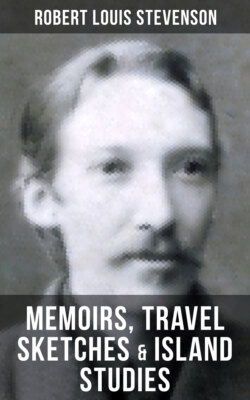Читать книгу Robert Louis Stevenson: Memoirs, Travel Sketches & Island Studies - Robert Louis Stevenson - Страница 73
На сайте Литреса книга снята с продажи.
III
ОглавлениеEvery one lives by selling something, whatever be his right to it. The burglar sells at the same time his own skill and courage and my silver plate (the whole at the most moderate figure) to a Jew receiver. The bandit sells the traveller an article of prime necessity: that traveller’s life. And as for the old soldier, who stands for central mark to my capricious figures of eight, he dealt in a specialty; for he was the only beggar in the world who ever gave me pleasure for my money. He had learned a school of manners in the barracks and had the sense to cling to it, accosting strangers with a regimental freedom, thanking patrons with a merely regimental difference, sparing you at once the tragedy of his position and the embarrassment of yours. There was not one hint about him of the beggar’s emphasis, the outburst of revolting gratitude, the rant and cant, the “God bless you, Kind, Kind gentleman,” which insults the smallness of your alms by disproportionate vehemence, which is so notably false, which would be so unbearable if it were true. I am sometimes tempted to suppose this reading of the beggar’s part a survival of the old days when Shakespeare was intoned upon the stage and mourners keened beside the deathbed; to think that we cannot now accept these strong emotions unless they be uttered in the just note of life; nor (save in the pulpit) endure these gross conventions. They wound us, I am tempted to say, like mockery; the high voice of keening (as it yet lingers on) strikes in the face of sorrow like a buffet; and the rant and cant of the staled beggar stirs in us a shudder of disgust. But the fact disproves these amateur opinions. The beggar lives by his knowledge of the average man. He knows what he is about when he bandages his head, and hires and drugs a babe, and poisons life with “Poor Mary Ann” or “Long, long ago”; he knows what he is about when he loads the critical ear and sickens the nice conscience with intolerable thanks; they know what they are about, he and his crew, when they pervade the slums of cities, ghastly parodies of suffering, hateful parodies of gratitude. This trade can scarce be called an imposition; it has been so blown upon with exposures; it flaunts its fraudulence so nakedly. We pay them as we pay those who show us, in huge exaggeration, the monsters of our drinking-water; or those who daily predict the fall of Britain. We pay them for the pain they inflict, pay them, and wince, and hurry on. And truly there is nothing that can shake the conscience like a beggar’s thanks; and that polity in which such protestations can be purchased for a shilling, seems no scene for an honest man.
Are there, then, we may be asked, no genuine beggars? And the answer is, Not one. My old soldier was a humbug like the rest; his ragged boots were, in the stage phrase, properties; whole boots were given him again and again, and always gladly accepted; and the next day, there he was on the road as usual, with toes exposed. His boots were his method; they were the man’s trade; without his boots he would have starved; he did not live by charity, but by appealing to a gross taste in the public, which loves the limelight on the actor’s face, and the toes out of the beggar’s boots. There is a true poverty, which no one sees: a false and merely mimetic poverty, which usurps its place and dress, and lives, and above all drinks, on the fruits of the usurpation. The true poverty does not go into the streets; the banker may rest assured, he has never put a penny in its hand. The self-respecting poor beg from each other; never from the rich. To live in the frockcoated ranks of life, to hear canting scenes of gratitude rehearsed for twopence, a man might suppose that giving was a thing gone out of fashion; yet it goes forward on a scale so great as to fill me with surprise. In the houses of the working classes, all day long there will be a foot upon the stair; all day long there will be a knocking at the doors; beggars come, beggars go, without stint, hardly with intermission, from morning till night; and meanwhile, in the same city and but a few streets off, the castles of the rich stand unsummoned. Get the tale of any honest tramp, you will find it was always the poor who helped him; get the truth from any workman who has met misfortunes, it was always next door that he would go for help, or only with such exceptions as are said to prove a rule; look at the course of the mimetic beggar, it is through the poor quarters that he trails his passage, showing his bandages to every window, piercing even to the attics with his nasal song. Here is a remarkable state of things in our Christian commonwealths, that the poor only should be asked to give.
